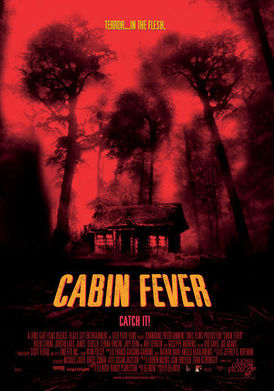
This past weekend, I rewatched a movie that I would not have originally classified as public health related, but it really is. To what film am I referring? Cabin Fever. The name even suggests its public health relevance, but when I saw this movie when it first came out in 2002, it was marketed as more of a horror flick. I remembered it as such. But in fact, it's more of an infectious disease thriller.
The movie tells the story of five college friends that rent a cabin in the woods for a week. Before they get there, it's clear that there is some infectious pathogen lurking in the woods; a local farmer is seen coming across infected animals. Our group of friends arrives during the early stages of an outbreak. One of them comes across the now infected and contagious farmer, and the disease quickly spreads.
I won't say more, since I don't want to give away the entire plot. What I will say is this fictional virus is absolutely disgusting. Symptoms include fever, skin deterioration and peeling, and hemorrhaging from bodily orifices. You were warned! The craziest thing about this movie--outside of the flesh-eating virus--is tracking the routes of transmission. Let's just say, it will have you skeeved out for sure.
Another interesting thing is watching relationships deteriorate as more folks become infected. The group attempts to disinfect contaminated areas, quarantine the sick, and initiate social distancing to reduce chance of infection.
There are definitely some teachable moments in this movie related to infectious disease transmission, outbreak response, and environmental health. We're adding this to the Let's Talk Public Health Watch List. Check it out and let us know what you think. P.S. Cabin Fever is the first in a trilogy. The sequel is Cabin Fever 2: Spring Fever (2009) and the third is Cabin Fever 3: Patient Zero (2014). There is also a 2016 remake of the original film.
0 Comments
Your comment will be posted after it is approved.
Leave a Reply. |
�
Learn about our blog submission guidelines. >>
The views and opinions expressed by individual authors on this blog are their own and do not necessarily reflect the official policy or position of Let's Talk Public Health.
Categories
All
|
|
Highlights
Explore
Connect
|
© 2024 Let's Talk Public Health, LLC. All rights reserved. | View our Privacy policy | Terms of service | Disclaimer | Editorial policy.

 RSS Feed
RSS Feed